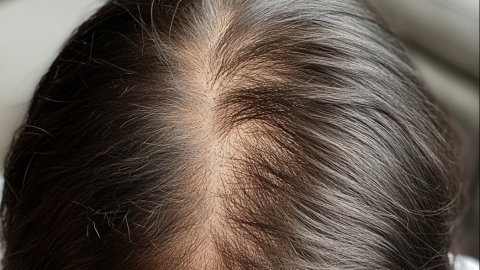What can be done about thinning hair on the crown of the head?
Generally, thinning hair on the crown of the head may be caused by genetic factors, excessive mental stress, improper hair care, aging, alopecia areata, and other reasons. It is recommended to seek timely medical attention, identify the underlying cause, and undergo general treatment, medication, or surgical treatment under the guidance of a qualified physician. Detailed analysis is as follows:

1. Genetic Factors
If there is a clear history of hair loss in the family, it may indicate the presence of specific hair loss genes. These genes may affect the hair follicle growth cycle, leading to thinning hair on the crown. It is recommended to follow medical advice and use medications such as finasteride tablets, fluticasone propionate cream, or spironolactone tablets to promote hair growth. Additionally, hair transplant surgery may be considered under a doctor's recommendation.
2. Excessive Mental Stress
Prolonged exposure to high-pressure environments can lead to excessive mental stress, causing hormonal imbalances in the body and disrupting the normal hair growth cycle, resulting in thinning hair on the crown. This may be accompanied by symptoms such as insomnia, anxiety, and irritability. It is recommended to maintain sufficient sleep, avoid excessive fatigue and stress in daily life. If necessary, consultation with a psychologist or undergoing physical therapies such as acupuncture and massage may help relieve stress and improve hair loss.
3. Improper Hair Care
The use of low-quality shampoo, frequent dyeing or perming, or excessive combing and pulling of the hair may lead to improper hair care, damaging the scalp hair follicles and causing thinning hair on the crown. This may be accompanied by symptoms such as scalp itching, pain, or swelling. It is recommended to reduce the frequency of dyeing and perming and choose suitable hair care products.
4. Aging
As one ages, the rate of hair growth slows down, and the activity of hair follicles decreases, leading to thinner and shorter hair, which results in thinning hair on the crown. This may be accompanied by signs of aging such as skin laxity and increased wrinkles. It is recommended to maintain good lifestyle habits, such as a balanced diet, moderate exercise, and adequate sleep. Additionally, regular scalp massage can help improve blood circulation in the scalp and promote hair growth.
5. Alopecia Areata
Alopecia areata is a type of hair loss caused by an autoimmune response attacking the hair follicles. If affected by alopecia areata, the immune system mistakenly identifies hair follicles as foreign invaders and attacks them, leading to thinning hair on the crown. This condition is often accompanied by round or oval patches of hair loss. It is recommended to seek timely medical attention and use medications such as pimecrolimus cream, tacrolimus ointment, or Yangxue Shengfa Capsules under a doctor's guidance. For severe symptoms, phototherapy may be used for treatment.
During treatment, in addition to following the doctor's recommendations, it is important to maintain healthy lifestyle and dietary habits to provide favorable conditions for healthy hair growth.




